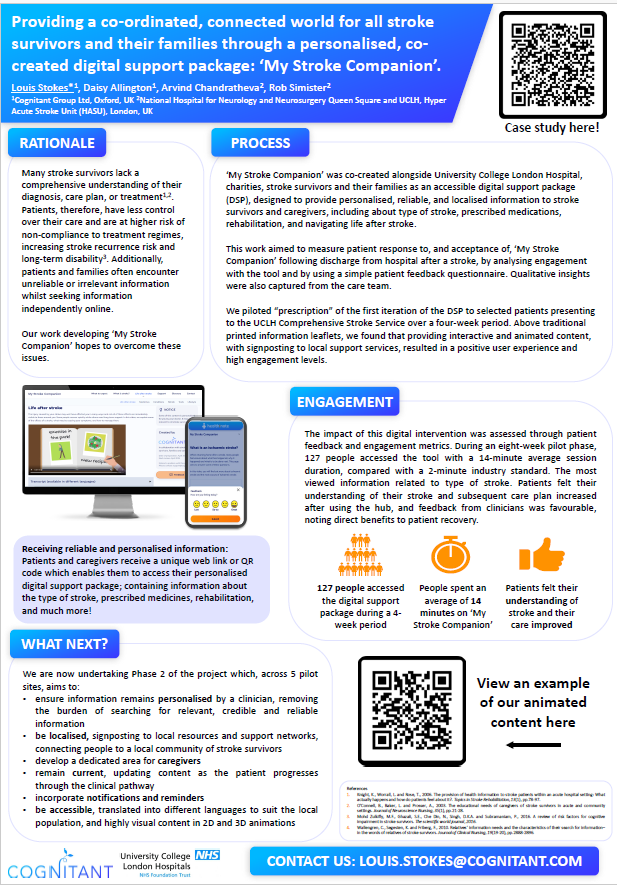This poster was presented at the European Stroke Organisation Conference (ESOC) 2023. Co-created with UCLH, My Stroke Companion offers personalised advice and support for stroke survivors and their care givers as they navigate life after stroke.

Abstract
Providing a co-ordinated, connected world for all stroke survivors and their families through a personalised, co-created digital support package: ‘My Stroke Companion’
Louis Stokes1, Daisy Allington1, Rob Simister2, Arvind Chandratheva2 1Cognitant Group Ltd., Research, Oxford, United Kingdom, 2National Hospital for Neurology and Neurosurgery Queen Square and UCLH, Hyper Acute
Stroke Unit (HASU), London, United Kingdom
Background and aims:
Many stroke survivors lack a comprehensive understanding of their diagnosis, care plan, or treatment. Patients, therefore, have less control over their care and are at higher risk of non-compliance to treatment regimes, increasing stroke recurrence risk and long-term disability.
‘My Stroke Companion’ was co-created alongside University College London Hospital, charities, stroke survivors and their families as an accessible digital support package (DSP), designed to provide personalised, reliable, and localised information to stroke survivors and their families, including about type of stroke, prescribed medications, rehabilitation, and navigating life after stroke.
This work aimed to measure patient response to the DSP following discharge from hospital after stroke by analysing use of the tool and from a simple patient feedback questionnaire. Clinician feedback was also captured.
Methods:
We piloted “prescription” of the first iteration of the DSP to selected patients presenting to the UCLH Comprehensive Stroke Service over a four-week period.
Results:
During the pilot phase, 57 people accessed the tool with a 13-minute average session duration, compared against a 2-minute industry standard. The most viewed information related to type of stroke. Patients felt their understanding of their stroke and subsequent care plan increased after using the hub, and feedback from clinicians was favourable, noting direct benefit to patient recovery.
Conclusions:
Patient information following stroke should be accurate, tailored, and accessible. Pilot data from the My Stroke Companion tool suggests the benefit of patients accessing the digital content. Further development of this system and detailed evaluation are now in progress.
Cognitant
Looking to empower people with health information for better patient outcomes?
Related News
Kidney Research UK invests in Healthinote patient education platform which could support >15m people with long term health conditions
April, 2025
Oxford, January 2025 – Kidney Research UK, the leading charity dedicated to kidney health, has made a significant investment in Cognitant Group Ltd, a leading...
Webinar Insights – Compliance vs Patient Engagement: Can They Co-Exist?
April, 2025
Is compliance really a barrier to meaningful patient engagement in pharma, or are outdated myths holding us back? In this recent webinar, Dr Tim Ringrose,...
Funding awarded to innovations that support early diagnosis and rehabilitation of Stroke patients
March, 2025
SBRI Healthcare, an Accelerated Access Collaborative (AAC) initiative, in partnership with the Health Innovation Network, has awarded £2.5 million for the development of five innovations...